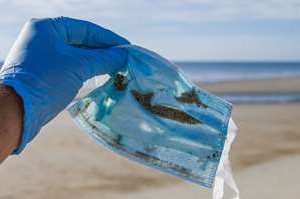 Hiding in plain sight: Covid's rubbish problem
Hiding in plain sight: Covid's rubbish problem
Every day, millions of people wear disposable masks to protect themselves and others from COVID-19. But the use and disposal of these masks may just end up strangling the environment.Sales of disposable surgical masks have exploded since the start of the coronavirus pandemic.
According to the UN Conference on Trade and Development (UNCTAD), global sales of the masks totalled approximately USD 166 billion in 2020, up from USD 800 million the year before. The value of EU imports of masks grew substantially from EUR 800 million in the first semester of 2019 to a whopping EUR 14 billion during the same period in 2020. While the masks are critical to protecting human health during the pandemic, they are having another impact altogether on the environment. The UN Environment Project (UNEP) estimates that 75 percent of the masks will end up in landfills or oceans, and there is already evidence that masks are polluting the environment.
A nuisance and a saviour
Face masks had been around for a couple of hundred years, but it was not until the 1980s that it was discovered that the qualities of materials made of polypropylene were optimal for filtering out airborne particles. The disposable face masks that mostly everyone now uses are made of nonwoven polypropylene, a non-biodegradable plastic. It’s so far, the most efficient material for disposable face masks.
“When it comes to filtering, polypropylene is superior due to the static charge it creates,” explains Ali Harlin, research professor at the Technical Research Centre of Finland (VTT).
But surgical masks made of polypropylene were never intended to be used by the masses. Since the pandemic started, a lot of masks have ended up in the sewers. Helsinki Region Environmental Services in Finland reported at least ten blockages in the city's sewerage systems weekly in April 2021 compared to only 1 or 2 blockages per week before the pandemic. The main culprit – hygiene products used to fight against the pandemic, such as hand wipes and disposable masks. Sewer blockages can cause leaks that end up damaging the surrounding water systems.
Other alternatives
Many organisations are now searching for both biodegradable alternatives to disposable masks as well as technical solutions to reuse them. VTT first started to search for alternatives for polypropylene around the time the pandemic first hit worldwide. The research team has been exploring the possibility of using wood pulp-based material and nano-filtering techniques. Research and development in this area are still ongoing.
Helsinki University and VTT have also started a project to develop civil protection against future pandemics. The project will address new technological, behavioural science, and societal solutions that are needed to prevent the worldwide spreading of such viruses as COVID-19.
“We are taking into consideration sustainability and the human aspect as well. Foreseeing potential risk factors is the key,” says Harlin.
One alternative to the trusted polypropylene mask could be to use a fabric mask with a single-use filter. Another option the research team is exploring is the possibility of combining filters and see-through plastic, which would give the opportunity to see the person’s face. This is important because one aspect of the project is to gain an understanding of how to help people accept the restrictions and safety measures that the pandemic has brought about. In associating with others, we prefer to see the other person’s face in order for the interaction to feel natural. Hence the idea of a mask with see-through properties.
"The behaviour of the user impacts how effective the face mask or any other protective gear will be. Therefore, ease of use and comfort are important as well," Harlin points out.
Reuse and recycle
The most important way to dispose of single-use masks is by incineration. The masks used by health care professionals are automatically sent to waste-to-energy facilities along with all the other hospital litter. In Finland, mixed waste collected from households is sent to incineration facilities. According to Kaisa Halme, communications specialist at Finnish Communal Waste-to-Energy Confederation, KIVO Finland, the huge quantities of disposable masks haven’t caused problems with waste management.
“There’s no issue with the disposal as long as people put the masks to their proper place, which is in sealed mixed waste bags and containers,” Halme says.
Even though disposable masks are promoted as being single-use only, they can be reused up to a point. VTT researchers have determined that disposable surgical masks can be washed up to 10 times and still retain their effectiveness better than cloth masks. A study by VTT conducted last fall showed that disposable masks can be washed either in a washing machine or by boiling them.
A recent study published in the Journal of Cleaner Production explored the possibilities of using disposable polypropylene masks to improve the mechanical properties of concrete. After removing the earl loops and inner nose wire, the masks were used in different mix designs with concrete. It was found that the introduction of the single-use face masks affected the overall quality of the concrete and led to an increase in the concrete’s strength properties.
With mask use set to continue for some time, it may take these innovative ideas and more to keep the world’s waterways from being another casualty of the pandemic.
